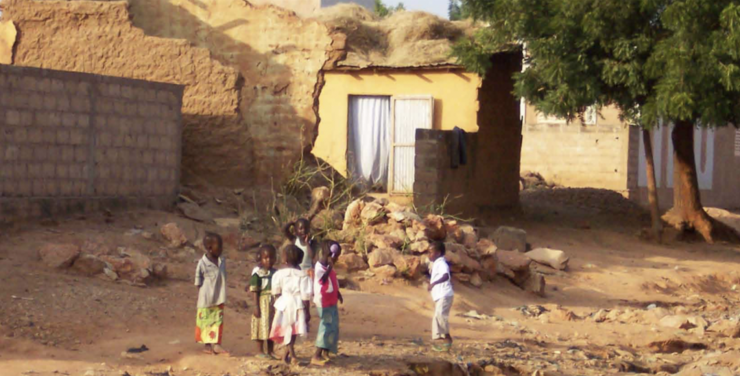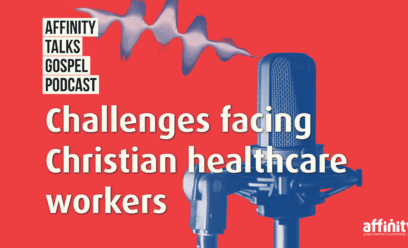No turning back – reaching the Fulani people for Christ

The following article is taken from the November 2019 edition of the newsletter of ReachAcross and is used with their permission.
The Fulani people are one of the hardest to reach Muslim people in West Africa and are Abigail’s chosen ministry focus. She recently attended a Sunday gathering of the only Fulani fellowship in this region, where a commitment to Christ cannot be taken lightly.
It is 9.00am. I start the day by putting on my blue African dress, trying to remember the correct way to tie the head covering for entering a place of worship. Before leaving my house I quickly grab my white scarf to wrap around my shoulders, a white scarf indicating I am on my way to pray, then begin my walk along the dusty path to the main road, passing some sheep and stray dogs.
It is Sunday, so the road is quiet, but I eventually flag down a taxi where I join three others in the car. ‘Salaam Alaikum’, I greet them upon entering; ‘Maa Laikum Salaam’ they reply. I pass the driver my 8 CFA fare (approximately 13p) and settle in for the first part of the journey. On passing the dump I have to cover my face with my scarf from the stench, and as I gaze out I notice an umbrella and coffee stand in the middle of a heap of rubbish as vendors sell coffee to people rummaging the dump – sifting through the rubbish for anything of value. As we head to a busier area I see some luxurious cars rivalling those found in the richest boroughs of England, but we also pass men transporting their goods piled metres high on rickety carts pulled by donkeys.
I get out at the end of the taxi’s set route and walk around the corner to catch the next one. As I wait, two small children at the market stall next to me are unable to contain their excitement at seeing a white person: ‘Toubab! Toubab!’ they continue to shout. Then a shabbily dressed man comes staring at me and chanting. I greet him ‘Salaam Alaikum’ but he does not reply and continues with his chant. After thirty seconds he walks on. The woman waiting next to me explains that it is an Islamic chant performed in exchange for the religious almsgiving.
I see another taxi and climb in next to three elderly women. They speak no English but I can see they are amused to see a ‘toubab’ wearing African clothes. Ten minutes later and I’m at my stop, where I walk down some more dusty paths to the church compound. The building has been set up as a seeker-friendly place for Fulani people so nothing about it signifies ‘church’ from a western point of view. I walk into the small round room, taking off my shoes as I enter the building. There are a few chairs at the side for the choir, but other than that the room is filled with mats. It is now 10am so I take my seat and the service commences on time with just myself and two other people – I wonder if anyone else will join?
By 45 minutes into the service the room is full, with 40 people sitting in a circle on the floor for worship. During the service an offering is taken for a family in a rural area that the Pastor will visit: their house has been burnt down by those who disapprove of their new faith.
Towards the end of the service the Pastor summons a young man who has just decided to follow Christ’s way that week. Before the Pastor will allow the community to pray for him he grills him extensively – “Has anyone forced you to make this decision? Has anyone paid you to do this? Is this your own choice?” It is commonly believed that those who follow Jesus have been ‘bought’ by Westerners or threatened by curses from local believers, so it is important for him to declare that this was his own free will.
They sing the song ‘I have decided to follow Jesus … no turning back, no turning back’ and then again, this time in their own language. I feel humbled in hearing them sing these words as I’ve heard some of their stories – children taken from parents who chose this new faith, careers ruined and reputations damaged. This song that is easy for me to sing now has a new significance as here, those who sing this song will face great hardships as a consequence of deciding to not turn back.
The service ends with a recitation of the Lord’s Prayer while taking on a prayer posture similar to Islamic prayers (biblical examples of this prayer posture can be found in Nehemiah 8 and 9). When Muslims pray together during Friday prayers, it is an extremely important expression of the Islamic umma community. For the new believers, many of whom have been exiled from their family and previous community, to pray in this way is a powerful expression of the new community they have found in Christ.
About the Fulani
- There are an estimated 39.5 million Fulani across 19 countries in West Africa
- In Abigail’s location there are 4.5 million with approximately 250 believers among them
- The Fulani hold fast to their Islamic traditions and identity. Part of their devotion to Islam comes from their major part in helping to spread Islam throughout much of Africa
- Pray for God to raise up intercessors to break up the hard spiritual soil of these regions
- Ask the Lord to send additional workers to bring the gospel to the Fulani people of West Africa
Related articles
Stay connected with our monthly update
Sign up to receive the latest news from Affinity and our members, delivered straight to your inbox once a month.



